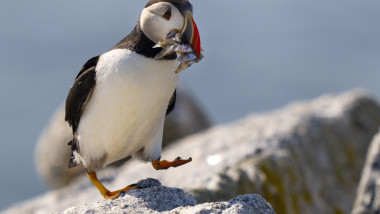Maine's puffin colonies recovering in the face of climate change
On remote islands off the Maine coast, a unique bird held its own this year in the face of climate change.
Atlantic puffins — clownish seabirds with colorful bills and waddling gaits — had their second consecutive rebound year for fledging chicks after suffering a catastrophic 2021, said scientists who monitor the birds. The news flies in the face of environmental trends, as scientists have said warming waters off New England jeopardize the birds because that reduces the kind of fish they need to feed their chicks.
One fish, though — the sand lance — has remained in abundance this year, allowing puffins to thrive, said Don Lyons, director of conservation science at National Audubon Society’s Seabird Institute in Bremen, Maine. He said it’s a sign the impact of climate change on ecosystems is not always as tidy as we think.
